Note
median culture is never being able to say anything about yourself without feeling like you were lying two seconds later
.
130 notes
·
View notes
Text
MAJOR UPDATE: Questioning systems or systems in a doubt spiral pls read.
I recently told my therapist about potentially being a system. This was a scary move because she has previously had some iffy takes about systemhood. But I told her because I trusted that she would meet me where I was at and help me navigate , at the least, the general idea of not understanding my own brain if nothing else which I was ok with. I told her and it went as expected. I explained why I thought I might be a system but also the doubts I had about it and how it was distressing me to not understand myself. She agreed to use the language I was using for it and was happy to help me through (as is her job) and also because whether it was systemhood or not it was something in me that was trying to be seen and we would work on figuring out what it was.
Fast forward a few session, and I was going through another bout of "what the fuck even is my brain". I was starting to realize that my "systemhood" is very different from the things I've been seeing online. In the ways that it's different to other systems is: - I'm always in the front, always in the captains chair - I have no amnesia because I never switch out - My hyper-vigilance never lets me dissociate fully though i definitely "check out" in my own way - Head mates just feel like vague ideas or emotions
But the ways that are similar are: - These vague ideas or emotions have opinions and feelings that are different from my own. - Though they are vague, I can definitely tell they are separate from what I have come to understand as "me" - I become "a different person" in the sense of my attitude, vibe, behavior, and opinions change from where they were 5 mins ago, but I am still me, just a different me.
Anyway, I was already trying to make sense of all of this and was not planning on talking about it with my therapist because nervous... However, my therapist ask me about it first. She asked some clarifying questions about my partners system vs my own and how they are different. When I explained what I just wrote above to my therapist she said "Thats what I thought and I owe you an apology."
Basically, my therapist, like any good therapist should when confronted by something they don't know a lot about, had been doing research on complex forms of trauma and coping. Things in the same vain as CPTSD and Plurality including those two topics. She had specifically been reading a book called "The Body Keeps The Score" (TW it is a book about trauma and studies of trauma so it has details of case studies that some people may find incredibly triggering). I did some research on what exactly the book was talking about in regards to "systemhood" and from what I've found, chapter 14 at the end of a section called "Writing to yourself" and the first parts of chapter 17 have interesting information regarding systemhood and how its not entirely limited to things that are diagnosable like DID or OSDD. It seems to talk about how we all have several selves and trauma can get in the way of those selves communicating effectively. My therapist told me about this book and what she learned from it and apologized to me because the book made her realize that she was wrong and that I was in fact a system....
The session ended and I just kind of sat there... not sure how to feel but definitely feeling relief and validation.
After doing research on the book to write this I have some words of wisdom. If you are a questioning system or are doubting your validity remember this: The human brain is so incredibly complex and no one actually understands how it does anything beyond its basic physical functionality... the conceptual abilities of our mind are a mystery. How we define self is just theory. If you don't fit into boxes, labels, identities, or diagnoses that does not mean your experiences aren't real. You are going to be ok. Understand YOUR mind and how it works for YOU, not through a label or diagnosis. If those things come later, great! Do not let them destroy you just because you don’t fit perfectly. I am a system. Simply. No types, labels, or diagnosis. I am a system. I have a unique experience because my brain is no one elses. I am a system. I may not have people in my head in the traditional sense but I'm also not alone up here either. I am a system. I am a system. I am a system. Nobody has the right to deny me this for they do not live behind my eyes.
As I understand myself: I am a system.
439 notes
·
View notes
Note
(I realize this may sound like bait, but I'm honestly trying to figure some stuff out rn and v lost) Do you have any thoughts on what the distinction between having parts, as in IFS, vs being a median system is? Or if there even is one?
A huge part of it, as with a ton of similar / overlapping labels, is basically down to personal choice, the community you feel you belong to, and whatever resonates with you the most. There is no clear cut distinction.
Sometimes one framework and terminology just feels more right for someone than the other. But they are also not exclusive of each other - Someone could consider themselves median because of their experiences with Internal Family Systems Therapy and the way that developed their understanding of their parts, for example.
15 notes
·
View notes
Note
Confirming- in IFS you aren’t creating new parts. You’re more so learning how to better tune into and listen to parts that are already there. Hope that helps clarify a little.
Thanks for clarifying. Have you done IFS? If I could ask a bit more about how all this works, how autonomous are the parts? How individualized are they? Are they able to take over the body?
Actually, I think I realized one issue I have with a lot of information about internal family system that is out there. It is all, to use a plural term, host-centric. That is to say that while I have seen people talk about communicating with their parts and I have seen therapists describe patients communicating with their parts, one thing that I have never seen described is what it is like from the perspective of the parts themselves. That's the missing piece for me.
With that in mind, assuming that these parts are autonomous and can communicate with you in words, would it be too much trouble to ask if you could let a part describe their experiences to me, what it's like just being a part, and you can transcribe it for them?
38 notes
·
View notes
Text
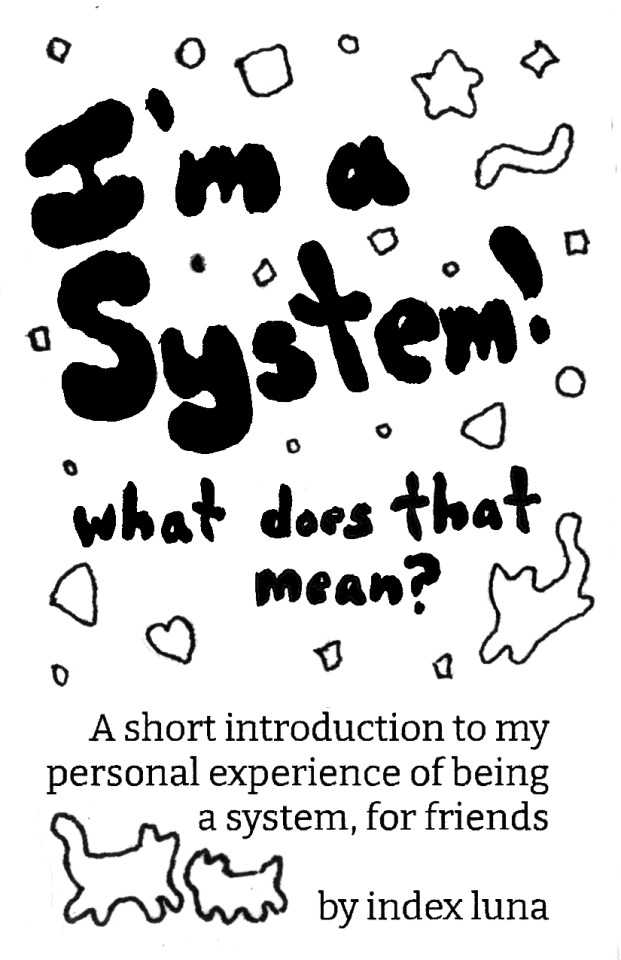
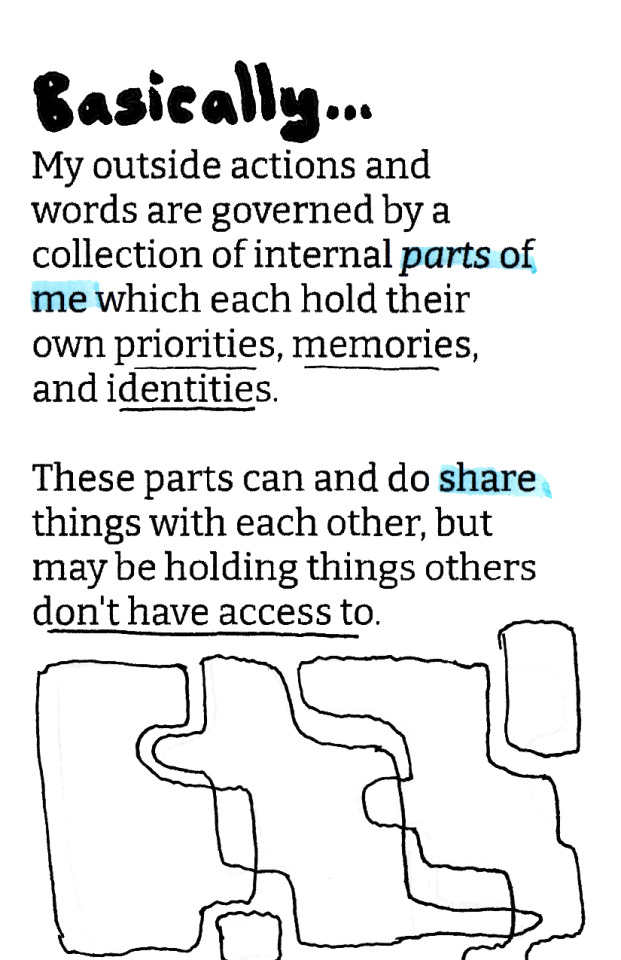
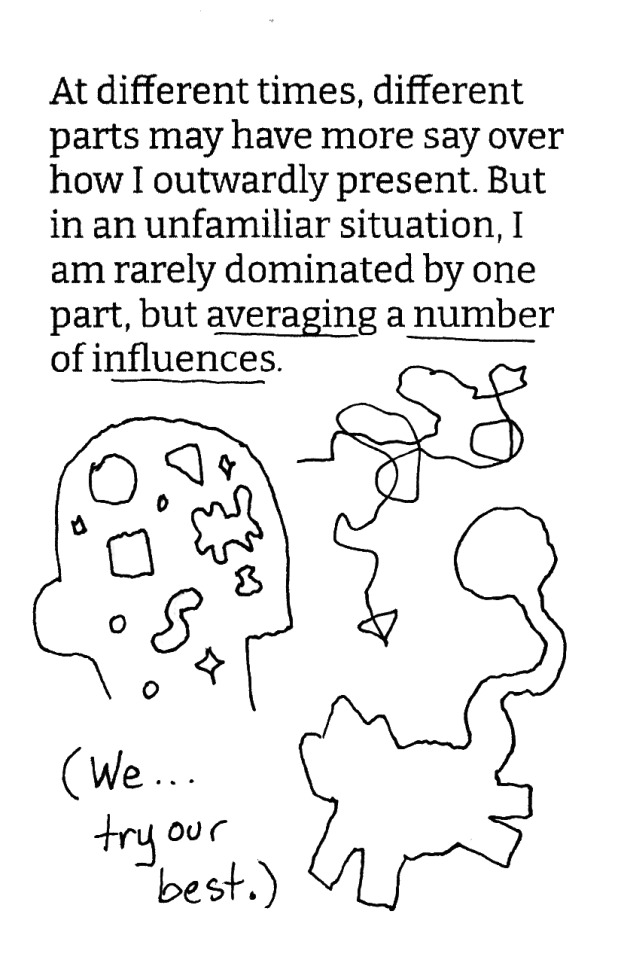
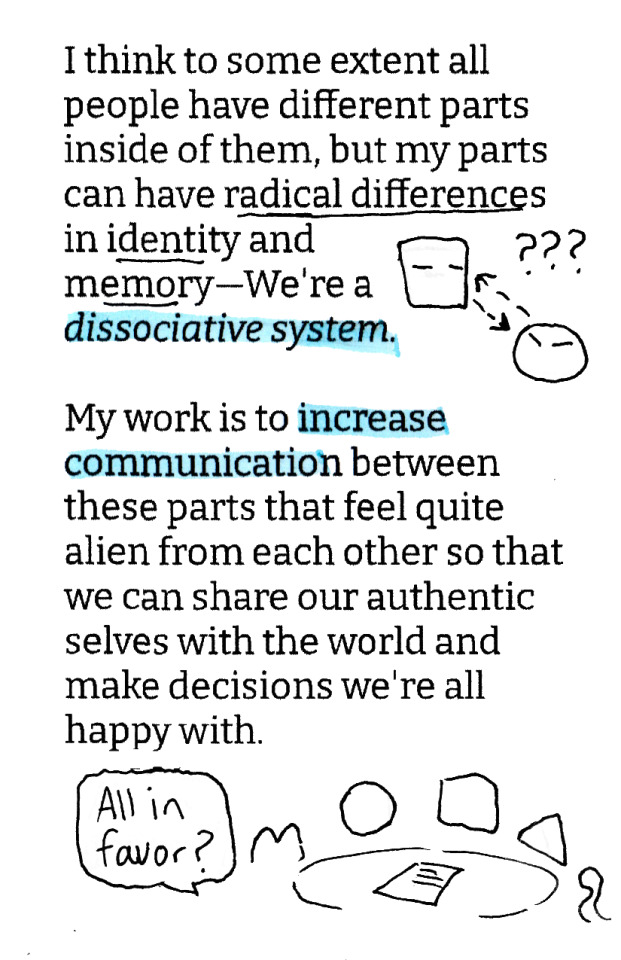
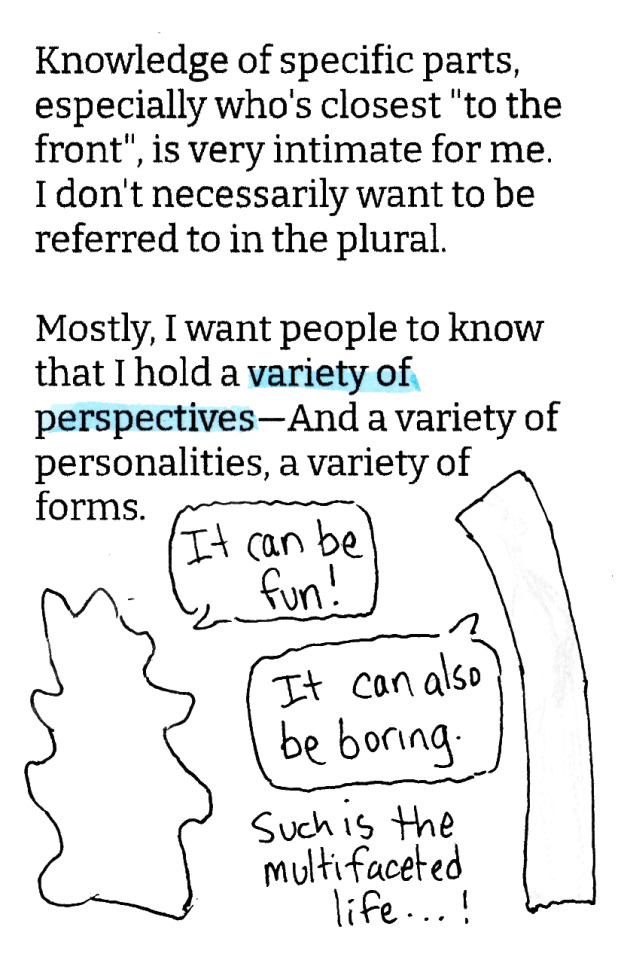

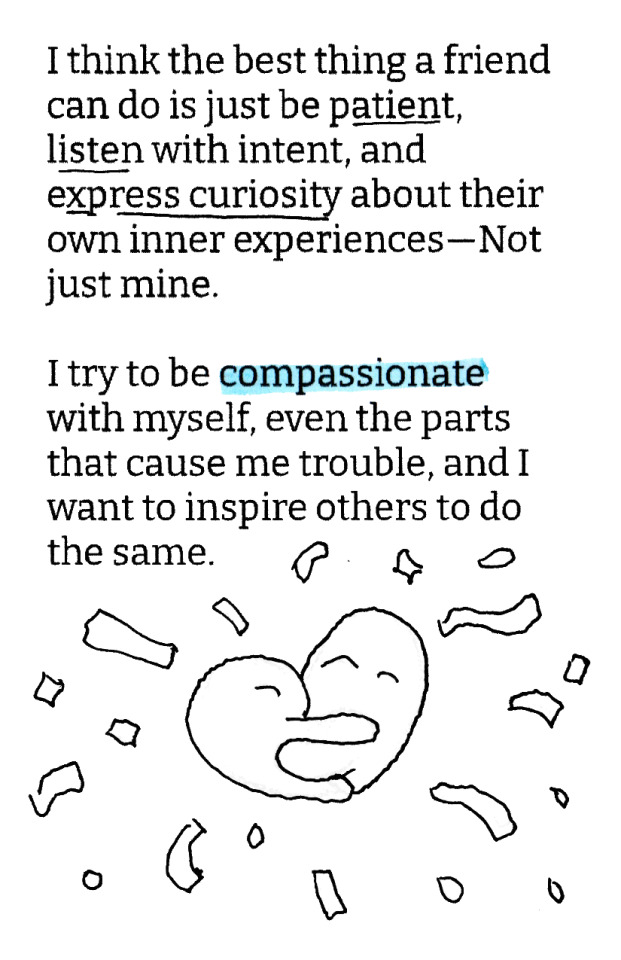
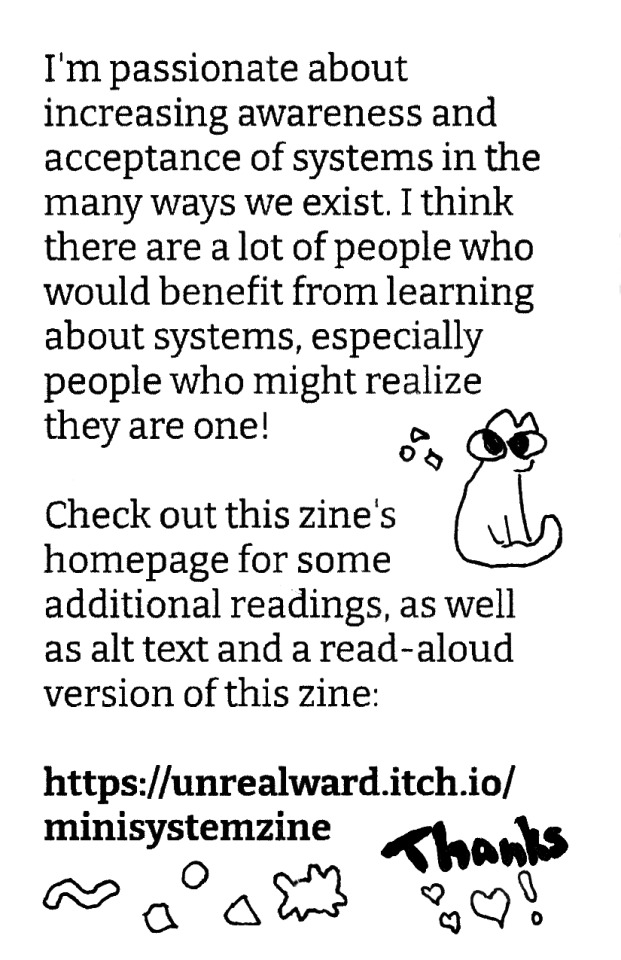
zine i made to help introduce (important parts of) myself. check it out on itch.io
266 notes
·
View notes
Text
inventing a new state of mind called Absolute Zen and it's when you stress so much for so long that your brain condenses like a can of soup extract and comes out on the other side completely full of peace and tranquility. and the stress is still there
687 notes
·
View notes
Text
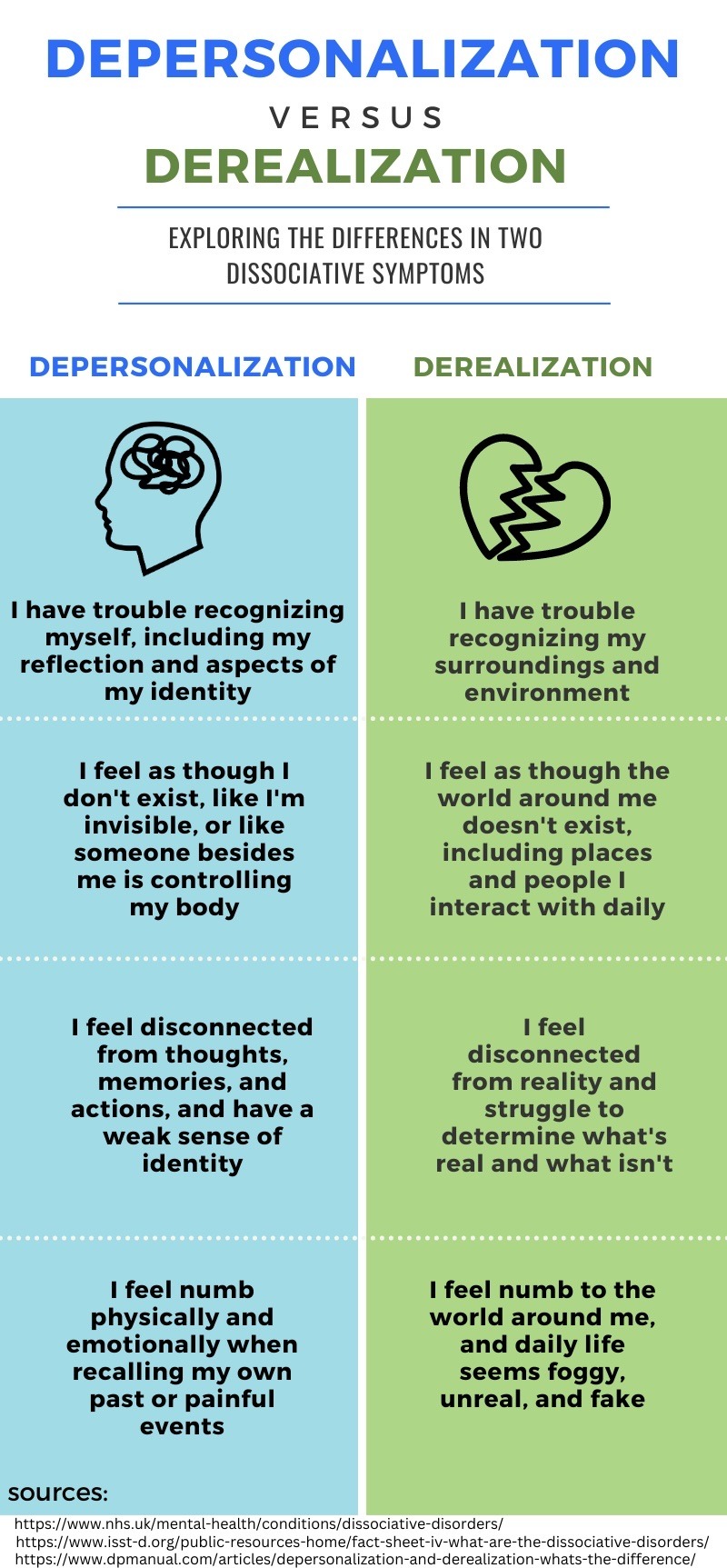
(Image ID:) a blue, green, and white graphic titled “Depersonalization versus Derealization: Exploring the differences in two dissociative symptoms” organized in two columns. The left hand column is titled “Depersonalization” with a stock icon of a head with a scribbled like for the brain. The right hand column is titled “Derealization” with a stock icon of a broken heart.
The statements in the “Depersonalization” column read: “I have trouble recognizing myself, including my reflection and aspects of my identity,” “I feel as though I don’t exist, like I’m invisible, or like someone besides me is controlling my body,” “I feel disconnected from thoughts, memories, and actions, and have a weak sense of identity,” and “I feel numb physically and emotionally when recalling my own past or painful events.”
The statements in the “Derealization” column read: “I have trouble recognizing my surroundings and environment,” “I feel as though the world around me doesn’t exist, including places and people I interact with daily,” “I feel disconnected from reality and struggle to determine what’s real and what isn’t,” and “I feel numb to the world around me, and daily life seems foggy, unreal, and fake.”
Below these columns is the word “sources:” with the following links:
https://www.nhs.uk/mental-health/conditions/dissociative-disorders/
https://www.isst-d.org/public-resources-home/fact-sheet-iv-what-are-the-dissociative-disorders/
https://www.dpmanual.com/articles/depersonalization-and-derealization-whats-the-difference/
(END ID)
This infographic was made by us, Halberd (@dreamlandsystem). Feel free to save and share as much as you’d like. Program used: Canva. Image credits: Pixabay. This infographic explores our personal experiences with DPDR, with additional sources for further reading.
2K notes
·
View notes
Text


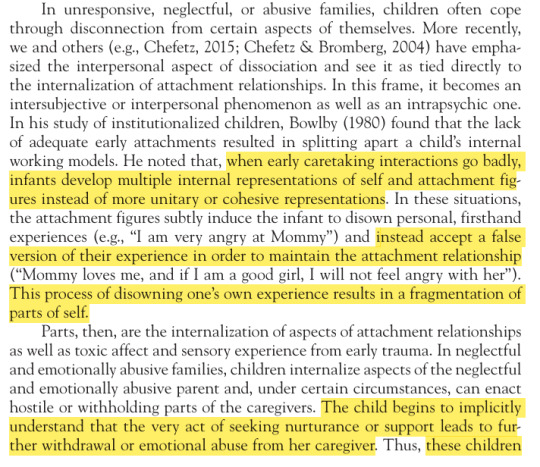
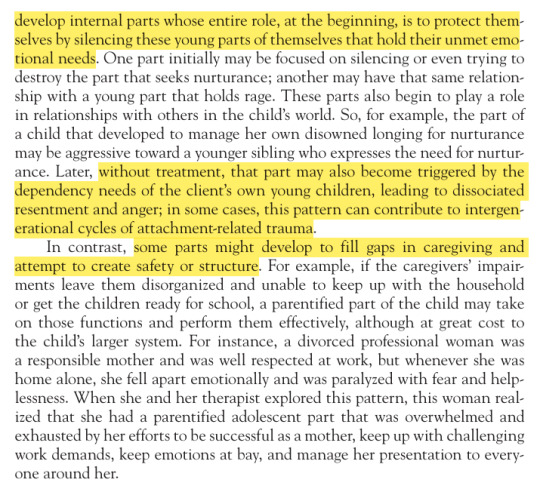
About dissociation in childhood, from Treating Adult Survivors of Childhood Emotional Abuse and Neglect (pp. 148-150)
994 notes
·
View notes
Text
Many people with a history of early traumatization have not had many opportunities to experience a safe environment or safe relationships, and therefore they have been unable to develop a sense of inner safety and security. Thus, it may be hard for them to even imagine what it feels like to be safe. They may know cognitively that their current environment is safe, and yet they do not feel safe or comfortable at all, as though something terrible is going to happen any minute. And even when their present situation is safe, some parts of them remain stuck in trauma-time, unable to experience the safe present.
In addition, traumatized individuals often do not feel safe with their own inner experiences, that is, with some of their own emotions, thoughts, sensations, and other actions of dissociative parts. Subsequent avoidance of inner experience makes it hard to stay present, and it sets in motion an inner cycle of fear, criticism, and shame, adding yet more to a lack of inner safety.
Coping With Trauma Related Dissociation
557 notes
·
View notes
Text
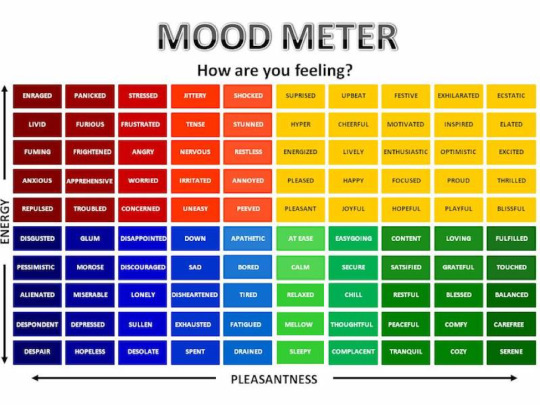
Alexithymia sucks. This chart helps!
How are you feeling? You don’t know? Me neither! So I look at this chart several times a day (got reminders set on my phone) to check in on how I’m feeling throughout the day. I’ve been doing it for a few months, and it’s actually getting a lot easier to identify how I’m feeling.
Pro tip: some people have to rely more on how their body feels to tell them what they’re feeling emotionally. Work on trying to identify how certain emotions feel in your body. Work in broad strokes at first, before working on identifying more specific emotions. For example, try to notice how sad, happy, angry, and afraid feel. Where in your body do you feel them? What physical sensations go along with the emotions? It’s different for everyone!
The more often you practice, the better you’ll get at it. This is all straight from my therapist and it’s how I’m finally feeling my feelings after years of dissociation.
2K notes
·
View notes
Text
When you’re mid sentence and suddenly forget literally everything you were talking about
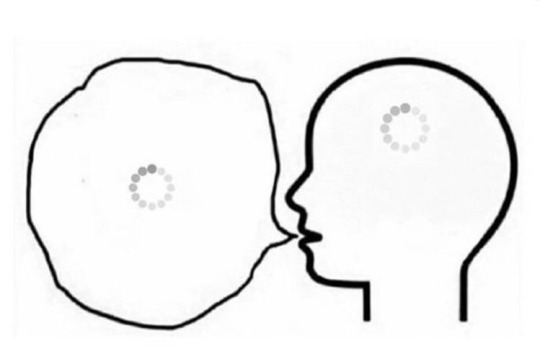
11K notes
·
View notes
Text

Relaxation vs Dissociation...
Thank you for all your support on Patreon! You can see all recent comics posted there, along with the behind the scenes process, outtakes, and other fun stuff! patreon.com/kimchicuddles
text reads:
Is it relaxation or dissociation?
Dissociation is a defense mechanism, and can even be life saving,
but is not a sustainable strategy for ongoing stress.
When we are relaxing, we are HERE,
and when we are dissociating we are split apart to AVOID being here.
Relaxation is often followed by clarity,
while dissociation is often followed by confusion,
or even memory gaps.
To shift from dissociation to relaxation I can ask myself...
What do I feel when I put my hand on my heart and take a deep breath?
What do I notice when I flex my fingers and press my toes on the floor?
173 notes
·
View notes
Text

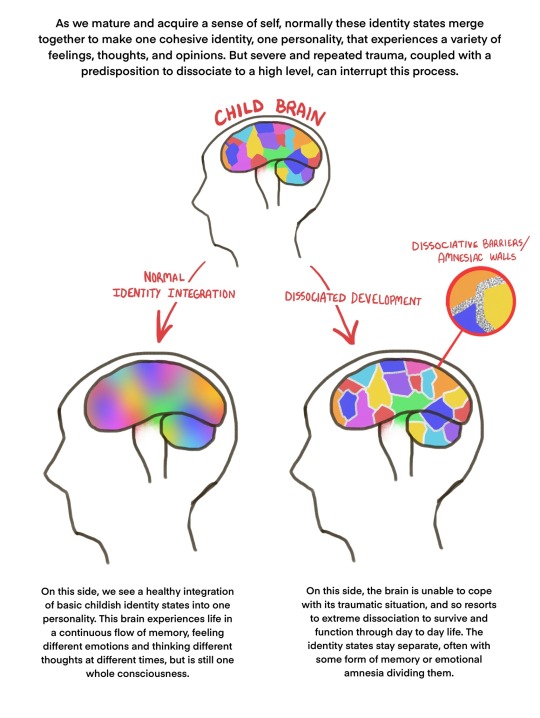
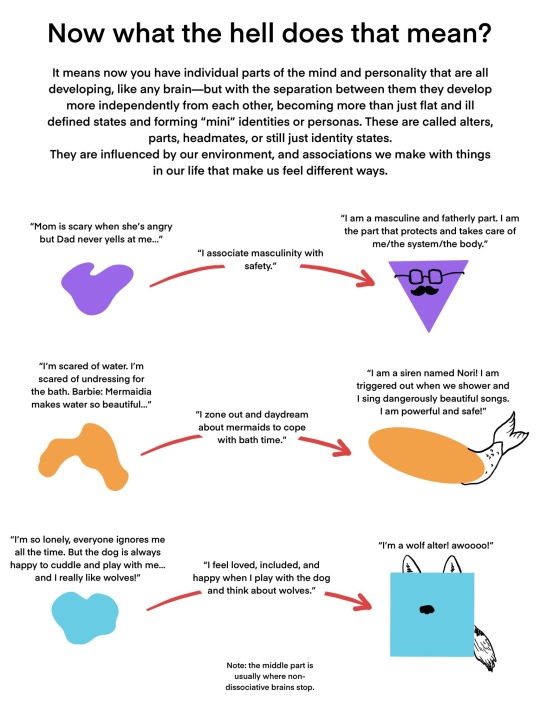
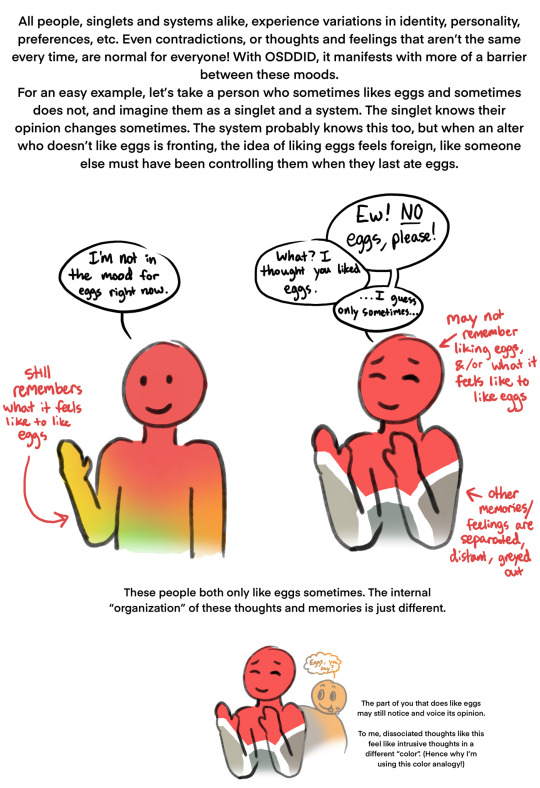
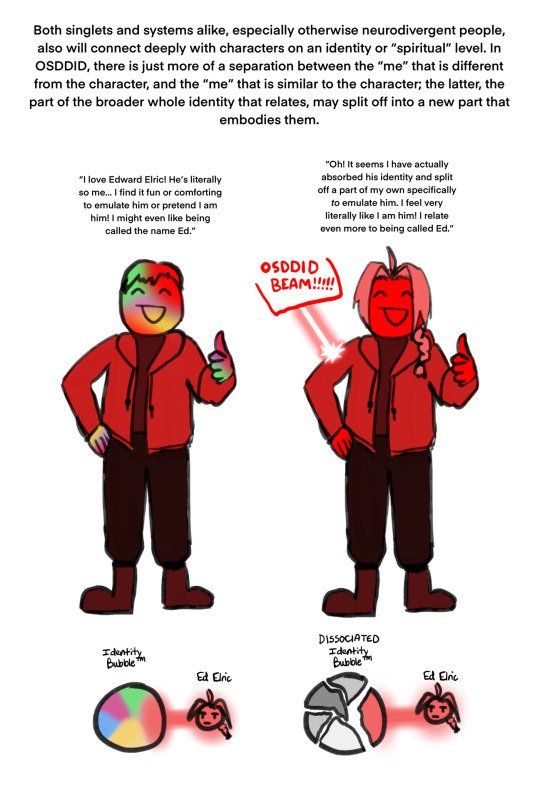
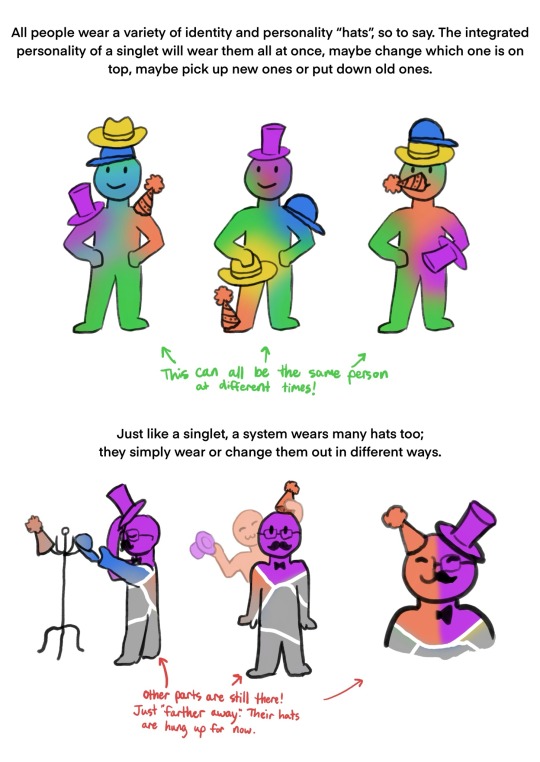
was gonna add more but i ran out of steam 😔👎 anyway here’s an infographic on how people with complex dissociative disorders are not that different from you lol
10K notes
·
View notes
Text
Anyone else sorting their alters into what acute stress response they usually exhibit? Idk we've found it somewhat helpful to understand why each of us react as we do

We also separate us into what emotions we each primarily feel. This simple image is helpful for us to remind ourselves that all emotions (and all alters) serve an important purpose!
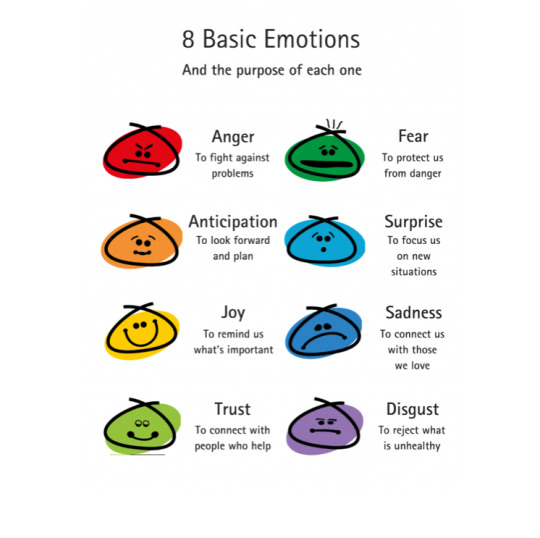
Idk if this is helpful to other dissociative people and this might be because we are also probably autistic, but categorising us in this way has been helpful to understand ourselves and to teamwork better
98 notes
·
View notes
Note
hello! when u have did or osdd how do u deal with the reoccurring denial that your alters are just mood states or normal singlet multidimensionalness of identity that you’re just misidentifying as alters? 😵💫 what can be said to prove to yourself otherwise? are there any sources/explanation on the differences between the two things (alters vs normal singlet variation of identity)? I saw your post on things that were actually did but u thought were normal.. and I was wondering if u had anything else related to say related to this topic?
For me, I eventually came to the conclusion that it doesn't really matter if what I'm experiencing are "alters" or "mood states" (or something akin to that) because ultimately it doesn't really matter if they're "truly" alters or not, what I experience is dissociation and a disconnected sense of self (among other things). Instead of trying to ascertain if what I'm experiencing is an alter or a mood state, I've found it more useful to just observe myself and my experiences. By noting things down that are actually observable, I can start to spot patterns and draw conclusions that way- and also keep an open mind that whatever conclusion I come to may not necessarily be fully accurate or correct.
Two analogies come to mind for myself- the first is that of stars and constellations. In one area of the world, we may draw shapes in the stars in one particular way. In another area of the world, we connect them differently. Are either of these patterns more correct than the other? No, we merely see different patterns in the same night sky, and it doesn't mean one is more or less correct than the other. The second analogy I have is that of scientific models- science is ever-evolving after all. The models we had hundreds of years ago may no longer hold up in current day due to new information and discoveries. With each new bit of research and observation of the universe around us, we grow closer to understanding how this universe functions and thus we need to change and update our models are we learn new things. Does this mean our old models were wrong? More often than not, they weren't wrong so much as they were incomplete- and in either case, it merely means that we now have a better understanding of the world and the universe around us.
Unfortunately I don't have any papers or research off the top of my head that can differentiate between alters in a dissociative system vs singlet "parts of selves". I'll post this ask either way, in case any of my followers can provide anything for you, anon!
17 notes
·
View notes
Text
this post is for the people with memory issues
people who's memories are getting worse every day, who's memories are stable but poor, people who can't remember what they did today or yesterday or this week, people who's childhoods are a faded blur. people who have slow greying-out amnesia that seems to just fade in and out of existence, and people who have complete blackouts, and people who have both. people who mourn the happy memories they know they've lost, who fear the bad memories they've lost that still affect them.
people who have "emotional amnesia" that makes it feel like none of their memories are their own, because there's few or no feelings attached. people who can ONLY remember the feelings from certain or even most memories, not actual events. people who's memory issues scare them or make them angry or make them miserable. people who's memory issues get them called childish or difficult or rude. who can't remember the names or faces of those they love. who are constantly forgetting the things that "you'd remember if you really cared". who misplace everything. who remember so little of their lives that they barely know who they are. people who's memory issues come from trauma/dissociation, ADHD, traumatic brain injury, brain fog/chronic fatigue, drug use, alcoholism. people who have no idea what causes their memory issues. people who's memory issues come from something else entirely.
i love you, you're strong, and you deserve support and care for what you're going through. memory issues can be frustrating and upsetting and disabling, and your suffering deserves to be recognized. whether you're soaring through recovery or are only ever going to get worse, you deserve good things in life and to live the fullest you can, regardless of how much you remember.
12K notes
·
View notes









